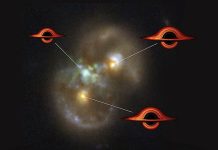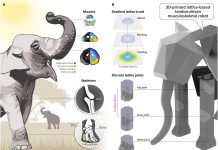
In a groundbreaking study led by UCL, researchers have harnessed the power of artificial intelligence (AI) to delve deeper into the mysteries of the universe, focusing particularly on dark energy.
This elusive force, which is believed to be driving the expansion of the universe, has long puzzled scientists.
The study, a collaboration of the Dark Energy Survey team, has significantly improved our understanding by using AI to analyze a vast map of the cosmos, covering the distribution of dark and visible matter over the past 7 billion years.
Published in the Monthly Notices of the Royal Astronomical Society and available on the arXiv preprint server, the research has refined our ability to measure key characteristics of the universe, including the density of dark energy, with double the precision of previous methods.
Such advancements in precision are crucial for the scientific community, as they help to eliminate previously plausible models of the universe that no longer fit these refined measurements.
Dark energy, which constitutes about 70% of the universe, with dark matter making up 25% and normal matter just 5%, remains one of the most profound mysteries in cosmology.
The research led by Dr. Niall Jeffrey and Dr. Lorne Whiteway from UCL Physics & Astronomy has demonstrated how AI can learn from simulations of various universes to enhance the accuracy of our estimates about the universe’s key properties.
Dr. Jeffrey pointed out that achieving this level of improvement through traditional methods would require data equivalent to mapping an additional 300 million galaxies.
This study aligns with the prevailing hypothesis of dark energy being a “cosmological constant” – a force with a constant value throughout space and time.
Yet, it also leaves room for alternative explanations, such as potential inaccuracies in our current understanding of gravity.
An intriguing aspect of their findings is the observation that matter in the universe is distributed more smoothly than predicted by Einstein’s theory of general relativity.
This observation, made possible by analyzing the weak gravitational lensing effect on the light from 100 million galaxies, provides a less significant discrepancy than previous studies suggested, owing to the refined error margins of this research.
The data for this comprehensive analysis came from the Dark Energy Survey, which captured the distortion in the shapes of galaxies caused by the gravitational pull of intervening matter.
This project, which catalogued hundreds of millions of galaxies over six years, represents a monumental effort involving over 400 scientists from 25 institutions across seven countries.
Looking forward, the team anticipates that upcoming projects, such as the European Space Agency’s Euclid mission, will provide even more data on the universe’s large-scale structures.
This will further aid in understanding the apparent smoothness of the universe, which currently contradicts predictions based on the cosmic microwave background – the afterglow of the Big Bang.
The use of AI in cosmological research marks a significant advancement in our quest to understand the universe’s most enigmatic components.
By harnessing cutting-edge technology, scientists are opening new avenues for unraveling the mysteries of dark energy and the fabric of the cosmos itself.
The research findings can be found in arXiv.
Copyright © 2024 Knowridge Science Report. All rights reserved.



